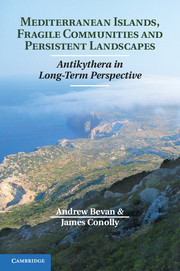 Mediterranean Islands, Fragile Communities and Persistent Landscapes
Mediterranean Islands, Fragile Communities and Persistent Landscapes Book contents
- Frontmatter
- Dedication
- Contents
- Figures and Colour Plates
- Tables
- Acknowledgements
- Abbreviations
- 1 Problems and Perspectives
- 2 Methods and Data
- 3 A Mediterranean and Island Environment
- 4 Material Worlds
- 5 Landscape Archaeology and Historical Ecology I
- 6 Landscape Archaeology and Historical Ecology II
- 7 Mobility and Investment
- 8 The Eccentric, the Specialist and the Displaced
- 9 Antikythera in Context
- Appendix I Statistical and Computational Methods
- Appendix II Locations by Period
- Miscellaneous Endmatter
- Notes
- Bibliography
- Index
2 - Methods and Data
Published online by Cambridge University Press: 05 July 2013
- Frontmatter
- Dedication
- Contents
- Figures and Colour Plates
- Tables
- Acknowledgements
- Abbreviations
- 1 Problems and Perspectives
- 2 Methods and Data
- 3 A Mediterranean and Island Environment
- 4 Material Worlds
- 5 Landscape Archaeology and Historical Ecology I
- 6 Landscape Archaeology and Historical Ecology II
- 7 Mobility and Investment
- 8 The Eccentric, the Specialist and the Displaced
- 9 Antikythera in Context
- Appendix I Statistical and Computational Methods
- Appendix II Locations by Period
- Miscellaneous Endmatter
- Notes
- Bibliography
- Index
Summary
Chapter 1 introduced some central themes that underpin much of the discussion found in this book, whilst also disclosing our own motivations in pursuing a Mediterranean small-island study. It emphasised both the attractive micro-context provided by Antikythera, as a window on the wider Mediterranean world, and the opportunities for more joined-up, regional thinking provided by unusually dense levels of archaeological and historical study in the south-west Aegean. This chapter now considers the occasionally mundane, but nonetheless crucial, methodological practicalities of observing material, environmental and historical patterns across Antikythera over its entire observable timespan of human activity. We do not dwell on methodological niceties for their own sake, but instead, consider them crucial for understanding what can and cannot be said on the basis of present evidence. With this perspective in mind, the following sections outline and justify the different fieldwork and other research procedures we have used to understand Antikythera's long-term history.
INTENSIVE SURVEY
Intensive survey is a strategy for recovering information about whole landscapes of human activity via detailed recording and/or collection of artefacts visible on the modern ground surface. It emerged in the 1960s and 1970s as a more systematic approach to site reconnaissance, and since then has become commonplace, particularly in those parts of the world boasting a combination of relatively light ground cover and comparatively dense coverings of potsherds, lithics or small structural remains (Fish and Kowalewski 1990; Banning 2002; Alcock and Cherry 2004).
Information
- Type
- Chapter
- Information
- Mediterranean Islands, Fragile Communities and Persistent LandscapesAntikythera in Long-Term Perspective, pp. 12 - 22Publisher: Cambridge University PressPrint publication year: 2013